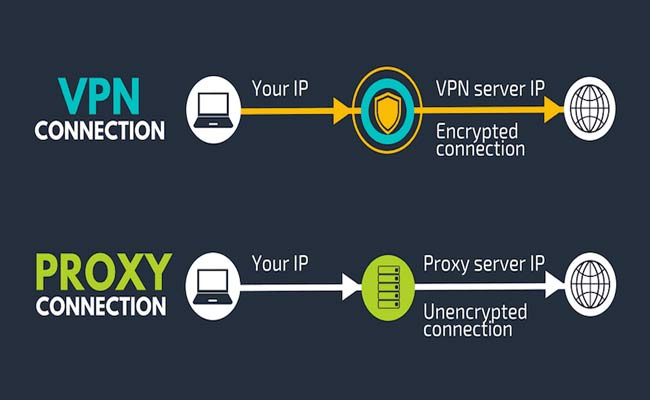
Why MMA Is Taking Over All The Fighting Sports
January 28, 2022
Lose Weight With London Weight Management
January 28, 2022Hello friends how are you all? Today we are going to talk about Proxies vs VPN: Which One Should You Choose? When a computer visits the web or participates in other internet activities, the IP (Internet Protocol) address indicates its location. Certain websites refuse to allow users to access their content from different regions.
This is a regular occurrence with streaming platforms that target certain geographic areas. Most websites also restrict their services based on your location.
Attackers can steal private information you submit on internet sites using several methods. They can use that data to access your financial transactions and other confidential info. To bypass these restrictions and protect your data, VPNs and proxies are used.
Proxies vs VPN: Why VPN And Proxies?
Your IP address is hidden from the websites you visit. The website will see the proxy or VPN server’s IP address instead of your original IP address. VPNs and proxies both provide a better level of privacy, allowing you to browse the web by masking your IP address in many ways. VPN and proxies both protect your data from cybercriminals. But, how they do this is completely different.
Proxy
A proxy serves as a link between your computer and the bulk of the internet. When you browse the internet using your browser, you usually connect straight to the page you’re browsing. Proxies act as a middleman between you and websites.
Your browser initiates a link with the proxy when you use an internet proxy. Which passes your traffic to the site you’re accessing. Due to this, proxies are also called “forward proxies”. An online proxy will also get the response from the site and return it to you.
Any system that interprets communication between networks or protocols is a proxy. It’s an intermediary service that sits between end-users and the websites they visit. Based on your demands, proxies provide varying levels of interactivity, protection, and anonymity
They enable users to escape access limitations and surveillance. Also, inability to access particular web pages.
Advantages
- Proxies are ideal for enhancing security.
- They hide your internet footprints, making it hard for hackers to access your private information.
- Proxies ensure that your data travels via a safe path.
- Proxies are ideal for accessing geo-restricted information since they thrive at IP masking.
Some proxies store your data, including SSL proxy. Proxy providers run their respective systems. For example, residential proxies from Rayobyte allow you to choose a certain location and access the internet. Proxies, which are categorized as middlemen, safeguard users from suspicious online traffic. Their proxies act as buffers while also hiding your IP address.
Disadvantages
- If you use proxies to hide your online activities, you may experience bandwidth problems.
- Due to excessive connection latency and other server activities, websites can take a long time to load.
- Proxies are also susceptible to security vulnerabilities.
- Some proxies can track your surfing activities and store login information.
Proxies are susceptible to hacking, enabling malicious people to penetrate systems or capture personal information. As a result, some users pay for a better proxy, which restricts the volume of visitors who may access it, allowing you to access it faster.
VPN
VPN provides online protection by establishing a connection from your public Internet connection. A VPN masks your IP address, making it hard to track your online activity. Most importantly, VPN services are encoded links, which provide more safety than private Wi-Fi hotspots.
The VPN on your PC establishes an encrypted link with the server, thereby erasing local ISP connectivity. VPN services, like proxy servers, hide and protect your internet traffic, with HTTP and Proxy servers from your browser.
Advantages
- The most compelling reason for using a VPN is the total encryption for all communication.
- A VPN is much safer than a proxy that costs the same amount.
- You can get a different IP address by using a VPN.
- You can also use a VPN on your mobile through a free VPN app.
- Save on eCommerce transactions because prices may differ in different regions. You can use locations where prices are lower and save your money.
Disadvantages
- VPNs sometimes have speed problems, regardless of how close you are.
- The VPNs are more costly to adopt than proxy sites, and they are more difficult to control.
- VPNs, like proxies, cannot ensure browsing anonymously.
- Your data will encrypt until it reaches the VPN, but it will decrypt until it reaches the website.
- Whenever you visit a new website, VPN only ensures an end-to-end secure channel if you’re using secure protocols.
Because VPNs rely on a user device to link to a server, any internal processing will cause the sessions to slow. But these services cannot guarantee your communication will be encrypted to the central server.
Proxy Uses
- Proxies are used by many businesses as content filters to prevent particular types of traffic.
- To avoid server breakdowns, proxies are used to balance traffic on both ends.
- It receives requests and passes them to the proper recipient.
- Firewall servers can be installed on proxy servers.
VPN Uses
- Because Vpn encrypts all of your private information, you can use public wifi. As public wifi doesn’t provide any kind of encryption and your data can go anywhere.
- Vpn provides secure communication between sites. For example, your office has two branches at different locations and you want to share files between them. Vpn securely can transmit data from client to server.
- Firewalls are set – up by some governments to limit what their citizens see and communicate with others both within and outside their boundaries. You can ‘tunnel out’ of censorship limitations and view the entire Internet by linking to a VPN server.
Which One Should You Choose?
Proxies and VPNs both give an extra layer of security and protection to your information.
If you wish to mask your IP, you can do so by utilizing a proxy or a VPN. A free proxy server would suffice if you’re concerned about surfing time and want to hide your IP address from a particular website or app.
If cost is a concern, using a proxy to access websites or sharing local files may be the best option. It is simple to locate free proxies that will conceal your IP.
Browsing through a VPN is the best option if you want to protect your browsing activities from hackers.
A VPN gives extra security if you intend to browse many websites while online. If you’re accessing sites like your bank or credit card portal. Both choices depend on your interests, whether you are using it for your business or an individual plan.
Final Thoughts
The distinction between proxies and VPN abilities is that proxies operate as a channel between the web and visitors. VPN on the other side routes through an encrypted connection and the user’s machine.
A solid VPN outperforms proxy privacy, security, and unlimited bandwidth capabilities. They’re also more dependable and functional with a wider range of devices. A proxy provides quicker speeds, is simple to install, and is often less expensive. Both solutions are efficient in impersonating your current location.




